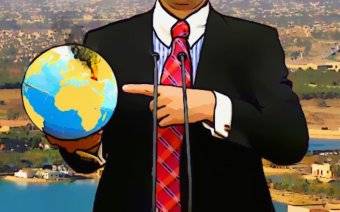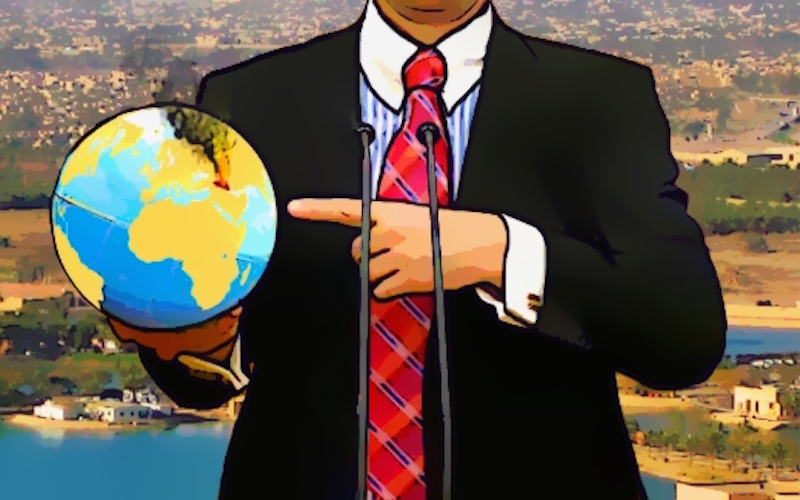When was Iraq founded?
Iraq was historically known as the “Land of Blackness”, Mesopotamia, or the land between two rivers, referring to the Tigris and Euphrates. Ancient civilizations such as Sumerians, Assyrians and Babylonians emerged in Iraq 7,000 years ago. Modern day Iraq was created after the Great Arab Revolt against the Ottomans during the First World War, from the merger of three Ottoman provinces, Basra, Baghdad, and Mosul at the hands of the British Mandate authorities.What is the ethnic and sectarian makeup of the Iraqi people?
Iraq has a diverse ethnic and religious composition. The largest ethnic groups are Arabs and Kurds. The majority of the population is Muslim, with Christian, Mandaean, and Yazidi minorities. Half of Arab Muslims in Iraq are Shiites, while the other half are Sunni. After the sectarian violence that followed the U.S. invasion, many members of minorities left, as they were targeted by armed groups.What is the most well known political 'norm' in Iraq?
Iraq has a sectarian quota-based power-sharing formula that emerged in the wake of the U.S. invasion and the overthrow of Saddam Hussein's regime. Since then, the custom has been for a Shiite to be the head of the executive branch, a Sunni to be the head of the legislative branch, and a Kurd or a consensus figure to be president, as well as a balanced representation for the three main communities.What is the nature of the Iraqi system?
Since the creation of the Republic of Iraq in 1958, the actual system of government tended to be a presidential one. After the fall of Saddam Hussein's regime in 2003, Iraq adopted a republican parliamentary system, concentrating powers in the hands of the prime minister and rendering the post of president rather honorary, to prevent dictatorships from reemerging.What are the major political fault lines in Iraq today?
The main fault lines in Iraq today involve issues like national identity, and the future plans for each religious community. The Kurds in northern Iraq believe that the current situation must be used to prepare the way for the long overdue Kurdish state. Kurdish leaders do not profess their intention to secede, but the Kurdistan region’s special status within Iraq resembles an undeclared state. The political and financial prerequisites of statehood have started imposing themselves on the relationship with the center. Oil exploration and exportation rights are one of the most important issues of contention with the central government today, in addition to disputed territories, especially the oil-rich city of Kirkuk. For Arabs, the Sunni-Shiite divide is the main fault line. The Shiite parties believe that Sunnis deal with them with fear and hostility, support anti-Shiite violence, and thereby push them into an alliance with Iran. As for Sunni parties, they believe that Shiites are seeking to monopolize power, and change Iraq’s Arab identity into an Iran-backed Shiite identity, pushing them into alliances with neighboring Sunni countries to thwart this.What are the most prominent political forces in Iraq today?
On the Shiite side, the strongest parties are the Dawa Party, led by current Prime Minister Nuri al-Maliki, the Supreme Council, led by Ammar al-Hakim, and the Sadrist movement, led by Moqtada al-Sadr. On the Sunni side, the strongest parties or politicians are: Osama Najafi (former speaker of parliament), Saleh al-Mutlaq (former deputy prime minister), the Muslim Brotherhood movement, in addition to various tribal leaders from the Sunni provinces. In Kurdistan the most prominent are the Kurdish Democratic Party led by Massoud Barzani, the Movement for Change led by Nawshirwan Mustafa, the Patriotic Union of Kurdistan led by Jalal Talabani, in addition to some Islamic forces.What are the most important milestones of Iraq's political history?
The Iraqi monarchy was declared in 1921, under the rule of the Hashemite dynasty founded by Faisal Bin Al Hussein. The monarchy came to an end in 1958, after a revolution led by Abdul Karim Kassem, who then declared the Republic of Iraq. In 1963, a Baathist coup deposed Kassem, and his comrade in the revolution Abdel Salam Aref was appointed as a figurehead until November of the same year, when Aref carried out a coup against the Baathists, taking advantage of the popular anger against them, and he became a president with full powers. Abdel Salam Aref died in a helicopter crash in 1965. The army backed the nomination of his brother Maj. Gen. Abdel Rahman Aref as president. In 1968, another Baathist coup overthrew Aref, and Ahmed Hassan al-Bakr was appointed president. In 1979, Bakr resigned and was replaced by his deputy Saddam Hussein. Saddam stayed on as president until 2003, when his regime fell with the American forces entering Baghdad. After that, a ruling body was appointed on the basis of a sectarian power-sharing quota. Ghazi Ajil al-Yawar served as the first President of the Republic after the occupation and he was succeeded by the current president, Jalal Talabani.What about Iraqi Kurdistan?
Since its inception, Iraq witnessed a sharp conflict between the Kurds and the central government. After World War I, the Kurds hoped to have their own state, but international political calculations prevented this from happening. Sheikh Mahmoud declared a Kurdish kingdom in 1923, but the British put down this attempt. Under the leadership of Mullah Mustafa Barzani, the Kurds continued their armed insurgency, demanding their own territory comprising the provinces of Erbil, Dahuk, Sulaymaniyah and Kirkuk. Several attempts to reach an agreement failed under the Iraqi monarchy and republic. Saddam Hussein was able to end the insurgency in Kurdistan in 1975 by signing the Algiers Convention for the demarcation of the border with Iran, in which he granted territorial concessions to the Shah of Iran in exchange for halting his support for Mullah Mustafa Barzani. The Iran-Iraq war (1980-1988) gave the Kurds the chance to resume armed struggle against the Baghdad government. Saddam Hussein retaliated with violent acts of revenge culminating with the chemical attack on Halabja in 1988, leaving nearly five thousand Kurds dead. Saddam launched the Anfal campaign after the ceasefire in 1988, burning down scores of Kurdish villages and killing thousands of Kurds whom Saddam accused of collaborating with the Iranians. After its defeat by the international coalition in 1991, the weakened Iraqi central government allowed the Kurds to self-rule. The Kurds saw the U.S. invasion of Iraq as an opportunity to enshrine their historical and political rights and establish their own entity. Currently, the Kurdistan region enjoys a great deal of autonomy from the central government, despite all the problems still marring their relationship. Kurdish leaders play an important role in Iraqi political life, whether in Parliament or the executive branch of the state. Kurdish cities, which are relatively secure, are witnessing a boom in development and economic activity.How are the economic conditions in Iraq?
Ninety percent of Iraq’s revenue comes from oil exports, which means that Iraq’s is a rentier state. The budget for 2014, which has not yet been approved, will include expenditures of $150.1 billion. Despite the size of the budget, the government’s operational costs alone account for 75 percent, placing a burden on the plans to develop other sectors. The Iraqi manufacturing sector, for example, is negatively affected by the dumping of imported goods. The same applies to the agricultural sector, which is suffering problems related to water scarcity, because of Turkish projects along the Tigris and Euphrates, and the lack of government investment.What is the nature of Iraq's relations with neighboring countries?
Border disputes with Iran and Kuwait led to two devastating wars. The first was the Iraq-Iran war between 1980 and 1988, aimed at reversing the 1975 treaty among other things. The war ended but the disputes remained unresolved, until Saddam Hussein invaded and annexed Kuwait in 1990 using historical pretexts, declaring it Iraq’s 19th province. After the invasion, Iraq acquiesced to the 1975 treaty with Iran again. An international coalition led by the United States defeated the Iraqi army in 1991 and drove it out of Kuwait. Iraq was placed under a crippling sanctions regime until the U.S. invasion in 2003. Currently, Iraq recognizes the 1975 border treaty with Iran. Iraq also recognizes the borders with Kuwait demarcated under UN supervision after the 1991 war. Past bitter experiences have closed the book on border disputes between these two countries, and historical claims regarding borders no longer exist in the Iraqi political lexicon.Can the Iraqi political regime be changed?
The Iraqi regime today is in the midst of sectarian alignments, and may not be changed, at least not in the foreseeable future as long as sectarian entrenchment fueled by mistrust, fear, and regional meddling, remain the key drivers of the political process in the country.Raseef22 is a not for profit entity. Our focus is on quality journalism. Every contribution to the NasRaseef membership goes directly towards journalism production. We stand independent, not accepting corporate sponsorships, sponsored content or political funding.
Support our mission to keep Raseef22 available to all readers by clicking here!






Join the Conversation
Anonymous user -
1 day agoتعليقا على ماذكره بالمنشور فإن لدولة الإمارات وأذكر منها دبي بالتحديد لديها منظومة أحترام كبار...
Anonymous user -
4 days agoالبرتغال تغلق باب الهجرة قريبا جدااا
Jong Lona -
4 days agoأغلبهم ياخذون سوريا لان العراقيات عندهم عشيرة حتى لو ضربها أو عنقها تقدر تروح على أهلها واهلها...
ghdr brhm -
5 days ago❤️❤️
جيسيكا ملو فالنتاين -
1 week agoجميل جدا أن تقدر كل المشاعر لأنها جميعا مهمة. شكرا على هذا المقال المشبع بالعواطف. احببت جدا خط...
Tayma Shrit -
1 week agoمدينتي التي فارقتها منذ أكثر من 10 سنين، مختلفة وغريبة جداً عمّا كانت سابقاً، للأسف.